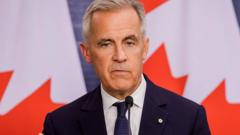Is Carney's Push for a Buy Canadian Policy a Game Changer for EV Targets?

Published: 2025-09-05 19:28:02 | Category: wales
Canadian Prime Minister Mark Carney has announced a pause on a key electric vehicle (EV) sales target while introducing a "Buy Canadian" policy to combat challenges stemming from US trade policies. This shift means that Canadian automakers will not be required to ensure that 20% of new car sales are electric by next year. However, the long-term goals for EV sales—60% by 2030 and 100% by 2035—remain intact. This decision comes as Canada faces economic pressures, including rising unemployment and recent job losses.
Last updated: 30 October 2023 (BST)
Key Takeaways
- The electric vehicle sales target has been paused, affecting the 20% requirement for 2024.
- Long-term goals for EV sales remain at 60% by 2030 and 100% by 2035.
- Canada's job market is showing signs of strain, with a rise in unemployment to 7.1%.
- A "Buy Canadian" policy will prioritise domestic products for federal contracts.
- Trade tensions with the US continue to impact Canadian industries, particularly automotive.
Background on Electric Vehicle Policies in Canada
The initial mandate for electric vehicle sales was established by former Prime Minister Justin Trudeau in 2023, aiming to transition Canada towards greener transportation options. This goal was part of a broader strategy to reduce carbon emissions and combat climate change.
However, recent economic challenges have prompted the current government to reconsider this approach. The pause on the 20% target reflects a more immediate need to stabilise the Canadian auto industry in light of external pressures, particularly from US tariffs on vehicles and goods.
Impact of US Trade Policies
Under President Trump, the US has implemented a 25% tariff on foreign vehicles, which has notably affected Canadian manufacturers. Despite some exemptions for Canadian and Mexican manufacturers, the auto sector—along with steel and aluminium industries—has faced significant challenges. The US has also imposed a blanket 35% tariff rate on many Canadian goods, further complicating trade relations.
In response, Carney's government is pursuing a "Buy Canadian" policy that aims to bolster domestic production and minimise reliance on imported goods. This policy will prioritise Canadian-made products for federal contracts and includes a new fund designed to support companies in developing innovative products.
Current Economic Climate in Canada
Canada's economy is showing signs of weakness, with the national statistics agency reporting a loss of 66,000 jobs in August alone. The unemployment rate has now risen to 7.1%, marking the highest level since May 2016, excluding the peaks during the Covid-19 pandemic. This sharp increase in unemployment is primarily attributed to a decline in part-time work, highlighting the fragility of the job market.
As the government grapples with these economic challenges, the decision to pause the EV sales target reflects a prioritisation of immediate economic stability over long-term environmental goals. The ongoing review of the electric vehicle mandate is expected to take 60 days and could yield further adjustments based on economic conditions.
The Future of Electric Vehicles in Canada
While the immediate target for 2024 has been paused, the overarching goals remain unchanged. The Canadian government still aims for 60% of new vehicle sales to be zero-emission by 2030, with the ambitious target of 100% by 2035. This long-term vision indicates a commitment to transitioning to a more sustainable transportation framework, albeit tempered by current economic realities.
Sales of zero-emission vehicles accounted for 11.7% of the market share last year, showcasing a growing acceptance among consumers. However, the automotive industry must navigate a complex landscape of tariffs and trade relations to encourage further adoption of electric vehicles.
Trade Relations and Economic Strategy
This month, Canada has also begun to lift some retaliatory tariffs on US products as part of efforts to restart trade talks with the United States. These negotiations are particularly focused on levies affecting specific sectors such as automotive manufacturing, which has been hit hard by recent trade policies.
Carney mentioned in a recent statement that he had positive discussions with President Trump regarding trade and is optimistic about securing relief for affected industries. The government’s willingness to engage in dialogue reflects a desire to rebuild economic ties and alleviate pressures on Canadian businesses.
Support for Affected Industries
In addition to the automotive sector, the Canadian government is also preparing to support canola farmers, who recently faced steep preliminary duties of 75.8% from China on seed imports. These tariffs are perceived as a response to Canada's previously imposed 100% tariffs on Chinese electric vehicles, influenced by US policy.
The interconnectedness of trade policies highlights the challenges faced by Canadian industries in the current global landscape. The government’s approach to support domestic industries while navigating international trade dynamics will be crucial in the coming months.
Conclusion: Navigating Challenges Ahead
As Canada moves forward with its economic strategy, the balance between supporting domestic industries and pursuing ambitious environmental goals remains delicate. The pause on the electric vehicle sales target reflects immediate economic concerns while still maintaining a long-term vision for a more sustainable future.
With ongoing trade negotiations and a focus on domestic production, Canada is at a pivotal moment in its economic journey. The outcomes of these decisions will shape the future not just for the automotive industry but for the Canadian economy as a whole.
What steps will Canada take to reinforce its industrial base while still promoting environmental sustainability? The decisions made in the coming months will be critical. #ElectricVehicles #CanadianEconomy #TradePolicy
FAQs
What are the new electric vehicle sales targets in Canada?
The immediate target of 20% electric vehicle sales for 2024 has been paused, but long-term targets remain at 60% by 2030 and 100% by 2035.
Why has Canada paused the electric vehicle sales target?
The pause is a response to economic pressures, including rising unemployment and the impacts of US trade policies, which have affected Canadian industries.
What is the "Buy Canadian" policy?
The "Buy Canadian" policy prioritises Canadian-made goods for federal contracts and aims to support domestic production amid challenging trade conditions.
How has the job market in Canada changed recently?
Canada lost 66,000 jobs in August, resulting in an increase in the unemployment rate to 7.1%, the highest level since May 2016.
What support is the government offering to canola farmers?
The Canadian government is preparing support for canola farmers affected by high tariffs imposed by China on seed imports, which are seen as retaliatory measures.



